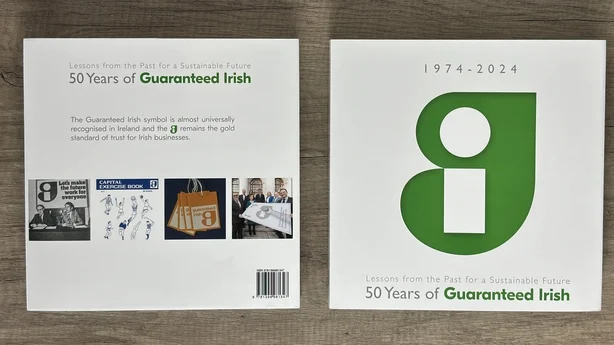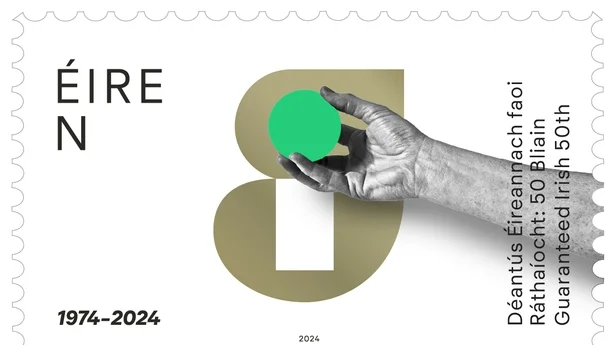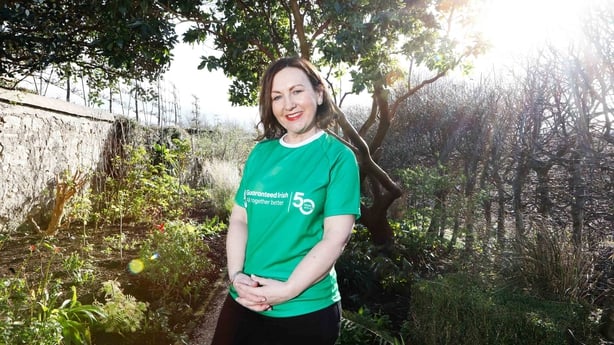We present an extract from the new book Lessons from the Past for a Sustainable Future: 50 years of Guaranteed Irish, written by historian Enda MacMahon.
Organisations to promote Irish manufacture and associated Buy Irish campaigns existed from the end of the 19th century but it was not until 1974 that the Guaranteed Irish scheme with its iconic symbol was inaugurated under the aegis of the Irish Goods Council.
In Lessons from the Past, Enda MacMahon provides a fascinating account of the background and history of the organisation, from its beginnings as a government-sponsored agency in 1974 to its reinvention in 1984 as a not-for-profit member-funded company, Guaranteed Irish Ltd, and the fifty years of its development and progress since 1974.
The EEC and Guaranteed Irish Ltd
What was effectively a Buy Irish campaign had been coming under the scrutiny of the EEC for a number of years. The Commission raised initial objections in a general way in 1978 when it indicated that 'promotion of "buy national" campaigns, sometimes with the support of public authorities', was contrary to the concept of free intra-Community trade and protectionist in nature. The Commission’s Industrial Affairs Department urged the then nine EEC member governments to refrain from such practices.
It had been observed that, despite the EEC having been in existence for twenty years, none of the member countries could honestly be said to have removed all anti-competitive practices designed to hamper the free flow of trade. Examples of these restrictive practices included requirements by some countries for import licenses or others demanding compliance with narrow technical standards. West Germany promoted an action taken against France for similar reasons and it is likely that Guaranteed Irish were incidental co-defendants to show that the Commission was acting in fairness to all member countries.
We need your consent to load this rte-player contentWe use rte-player to manage extra content that can set cookies on your device and collect data about your activity. Please review their details and accept them to load the content.Manage Preferences
After several interactions with the Commission in 1982, Ireland was taken to the European Court for failing to fulfil its obligations under Article 30 of the EEC Treaty. The state, represented by the Chief State Solicitor and two senior counsel, fought the case but on 24 November 1982 the European Court issued its judgement, finding against Ireland…..
The Irish Goods Council had run the Guaranteed Irish Campaign for six years but the decision of the EEC in 1982 meant an end to this. The Commission gave the Council a year to divest itself of Guaranteed Irish. The Shoplink scheme also had to be discontinued: in fact, this had already been brought to an end in May 1981, before the EEC decision. The Community had taken issue with the display of Irish goods in Merrion Hall because it showed only Irish products and after sixty years in existence, much of this period in St Stephen’s Green, the display was discontinued. For the next year the Goods Council stood back from Guaranteed Irish and, while the scheme remained in place, it made little progress in 1983. The level of government funding allocated to the Goods Council was reduced that year. Media advertising for Guaranteed Irish, the main publicity engine of the Goods Council, ran at £283,000 in 1981 but fell to just £2500 the following year, as the government complied with the EEC ruling. Effectively Guaranteed Irish was in abeyance from the end of 1982 until the beginning of 1984.

Sustainable Future: 50 years of Guaranteed Irish'
The government turned to the Attorney General, Peter Sutherland, to prepare a report into how best to progress both Guaranteed Irish and the Irish Goods Council in light of the adverse Commission ruling. Sutherland’s report in January 1983 suggested four possible options but specifically proposed that Guaranteed Irish be transferred to private control and supported by industry under the direction of the Confederation of Irish Industry (CII).The Goods Council, the report suggested, could continue by removing certain references from its articles of association. The report noted that both CII and Vivian Murray were in agreement with the proposals. It also very clearly stated that following the judgment ‘Ministers [were] to refrain from Buy Irish speeches [and] general Buy Irish advertising [was] to cease.’ The Attorney General did consider that it might be necessary to merge the Goods Council and Córas Tráchtála, which came to pass eight years later.

most recognisable home-grown emblems
There was an ongoing relationship between the Confederation of Irish Industry (CII) and Buy Irish campaigns over the years and the fact that Goods Council Chair T.P. Hardiman was CII president in 1982-3 improved the chances that Guaranteed Irish Limited would be formed under the Confederation’s auspices. In January 1984 a meeting was held in the CII headquarters, Confederation House in Kildare Street, of what was entitled the Guaranteed Irish Steering Group.The attendance consisted of individuals who would be the founding board of the new company as well as two representatives of the CII, including Liam Connellan, its CEO, and Vivian Murray and Joan Mahony from the Irish Goods Council. Norman Kilroy, CEO of Nokia in Ireland and a board member of the Goods Council since 1982, chaired the meeting. Vivian Murray took the lead, outlining ‘the background to the transfer of the Guaranteed Irish scheme from public to private sector auspices’, and describing how the Goods Council had managed Guaranteed Irish by maintaining a register of qualifying manufacturers, encouraging the use of the symbol on products and packaging and promoting awareness of the symbol amongst consumers.

The meeting resolved to form a new self-financing company, Guaranteed Irish Limited, to take over the functions of the scheme from the Irish Goods Council. The Council was to contribute £7000 and a stock of Guaranteed Irish ‘swing’ labels worth a further £3500. Liam Connellan of CII welcomed the opportunity for the Confederation to be involved in the administration of the scheme.
He had no further direct involvement with the new company but John Kenna from CII became a board member and served as company secretary for the first decade. As with the original board there was input from the trade unions as well as business interests. Along with Kilroy and Kenna the new board members were: John Mitchell from the Irish Union of Distributive Workers and Clerks; Tom Rea of Clerys; Michael Jacob of Premier HB dairy; Pat Pierce of Glen Abbey and Brian Brennan of Irish Ropes – all men and almost all from business. Shortly afterwards Mary Dowling from Kilkenny Design joined the board.

Guaranteed Irish Ltd, a private company limited by guarantee and without share capital, was incorporated on 22 February 1984 and in March an advertisement for an executive director for the new company was published. Candidates, who were expected to have practical marketing experience, were required to ‘market and promote the Guaranteed Irish Symbol, initiate imaginative campaigns and increase public support for Guaranteed Irish products and operate a consumer complaints service’. A pretty onerous amount of work for just two staff, it would seem.
Lessons from the Past for a Sustainable Future: 50 years of Guaranteed Irish is published by Londubh Books.
Disclaimer: The copyright of this article belongs to the original author. Reposting this article is solely for the purpose of information dissemination and does not constitute any investment advice. If there is any infringement, please contact us immediately. We will make corrections or deletions as necessary. Thank you.






